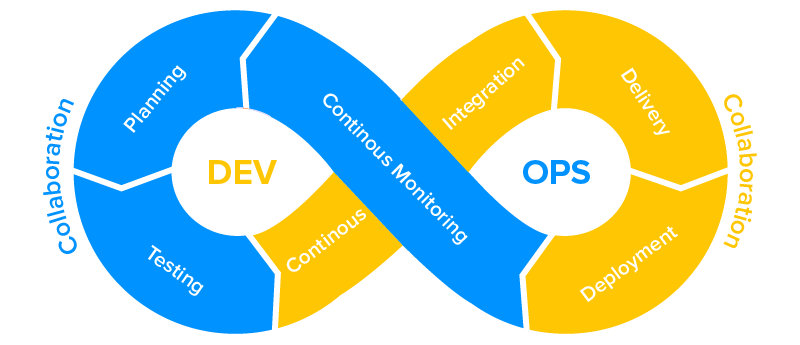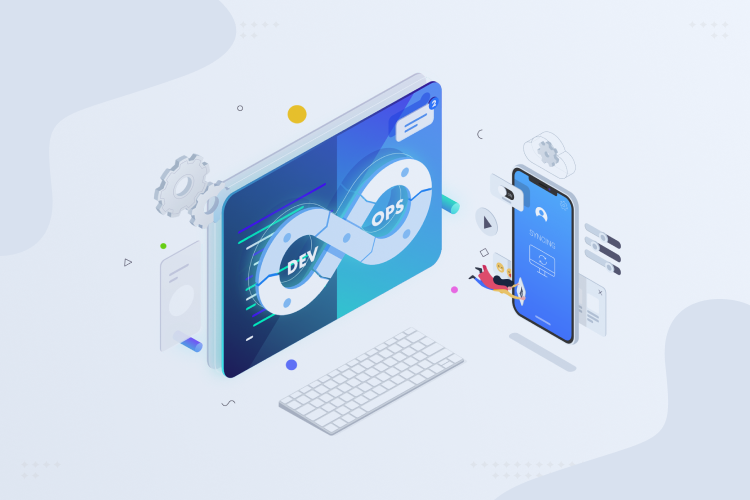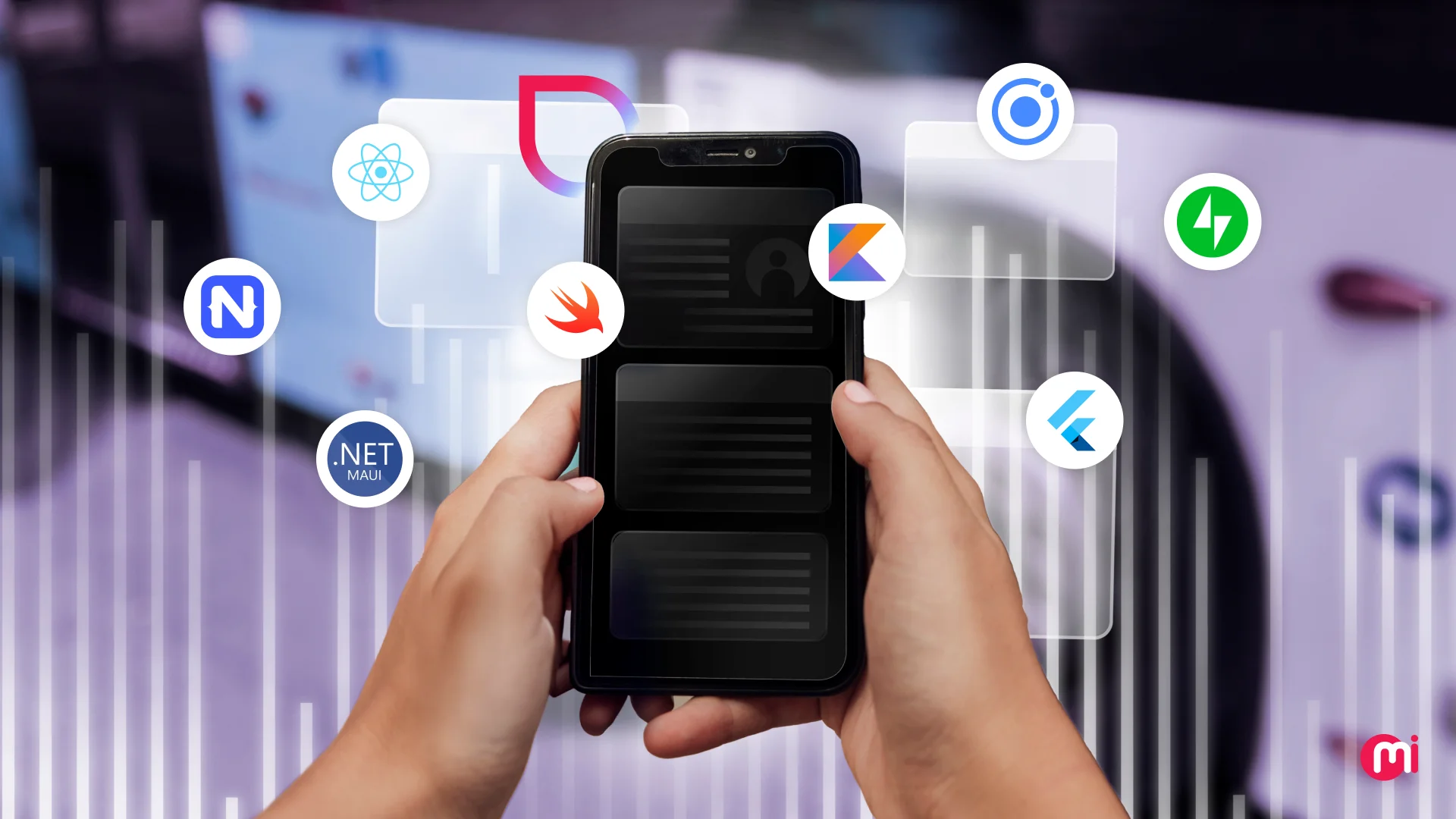The Role of DevOps in Mobile App Development
- Mobile
- December 21, 2020
For the last few years, millions of people worldwide have been using mobile devices as the main source of accessing the internet. For this reason, many industries are and will continue to developed mobile applications for their businesses. During the last few years, the IT industry mainly concentrated on fulfilling the market demand and their businesses were focused on making a market existence.
This post focuses on why to use DevOps in mobile app development, its benefits, challenges it faces, and how you can implement it in your app development project. So, let’s get started!
What is DevOps?
DevOps is an exclusive methodology that highlights effective cooperation among all stakeholders engaged in producing a digital product. It incorporates operation staff members, app developers, and project managers.
The concept behind DevOps for mobile app development is to support a culture of cooperation between teams that earlier worked individually. DevOps is not solely an approach; it can be mainly considered a state of mind or culture. It causes a shift in the mindset, promotes deeper integration, and enhances cooperation.
DevOps reduces the gap between operations and development and wins over the challenges related to constant software development. DevOps brings automation, constant delivery, and agile together so that operation and development teams can be more productive and launch software more dependably and quicker.
According to research, companies that used DevOps shown 63% encounter improvement in their software deployment quality and 63% could launch new software more frequently.
Is DevOps Important for Mobile App Development?
For app development companies, DevOps is extremely useful. It’s not a very simple procedure in the starting, slowly it becomes easier when you start applying and executing this procedure precisely. Then, you can see its effectiveness, productivity, revenue, and customer satisfaction.
However, when you begin using DevOps in mobile app development, you must ponder some important issues, the most recent concerns, and their solutions.
The Essential 6 C’s of Mobile DevOps
Mainly, there are six important elements of the DevOps methodology. These elements connect the entire procedure and make sure the security and quality of software.

1. Continuous Planning
Continuous Planning integrates Agile methodologies with DevOps to create adaptable development roadmaps. By using tools like Jira, teams can manage tasks, prioritize features, and respond to changing requirements in real time. This flexibility ensures alignment with business goals and user needs, setting the stage for a streamlined development process. For startups, this approach is key to building a minimum viable product (MVP) that evolves with market demands.
2. Collaborative Development
At the heart of DevOps lies collaboration. Collaborative Development leverages version control systems like Git and platforms such as GitHub to enable developers, designers, and other stakeholders to work together seamlessly. Code reviews, issue tracking, and simultaneous feature development minimize conflicts and enhance team productivity, fostering a culture of shared responsibility. This approach is particularly effective for SaaS application development, where cross-functional teams drive innovation.
3. Continuous Integration (CI)
Continuous Integration automates the building and testing of code changes as they are committed to the repository. Tools like Jenkins or GitHub Actions run automated tests with every commit, catching integration issues early. This practice ensures a stable codebase, reducing the risk of bugs and accelerating development cycles. For teams modernizing legacy systems, CI is a cornerstone of application modernization services.
4. Continuous Testing
Given the fragmentation of mobile devices and operating systems, Continuous Testing is critical. Automated testing frameworks like Appium and real-device clouds such as BrowserStack enable comprehensive testing across diverse environments. This ensures that apps perform reliably on various devices, enhancing user satisfaction and minimizing post-release issues. Such rigorous testing is vital for delivering robust progressive web apps.
5. Continuous Delivery (CD)
Continuous Delivery extends CI by automatically deploying tested code to staging or production environments. Tools like Fastlane simplify complex tasks such as code signing, provisioning profiles, and app store submissions for both iOS and Android. Phased rollouts further reduce deployment risks, allowing teams to deliver updates frequently and reliably. This capability is essential for software development outsourcing services to ensure consistent delivery.
6. Continuous Monitoring
Post-deployment, Continuous Monitoring ensures app performance and user satisfaction. Tools like Firebase Crashlytics provide real-time crash reporting, while New Relic offers detailed performance metrics. Analytics platforms like Google Analytics deliver insights into user behavior, enabling data-driven decisions for future updates. This data-driven approach aligns with data science services to optimize app performance.
Advantages of DevOps in Mobile App Development
In case you have been thinking about why DevOps is perfect for mobile app development, here are the top benefits of adopting DevOps:
1. It Creates Better Apps
DevOps helps create better apps that cause a better user experience. You must consider that the user experience is one of the most essential factors for the accomplishment of any business.
DevOps helps in immediate reporting and feedback, clear development procedure, and regression testing, which are extremely advantageous for quicker solutions, removal of errors, and UX optimization.
2. It Tests and Monitors Mobile Apps Continuously
Since there are many OS versions, it’s not possible to test all versions manually. However, maximum mobile app testing is manually done on simulators rather than actual gadgets. In the manual testing process, a mobile app may work properly during the testing period, but it does not mean that it will experience failure in the live environment.
The factors responsible for its failure may incorporate power, network conditions, memory, etc. Hence, to abstain from these kinds of problems, both developers and businesses should monitor continuously via third-party SDKs for crash reports, log reports, and more to discover the reason behind the failure.
3. It Helps Maintain Software Development Process’ Quality
DevOps helps keep up with the quality of app development procedure as it can monitor all parts of the code from start to delivery while pondering corrections that are included in between.
For further app performances, ratings, and feedback on it are important. And DevOps helps solve bugs and updates for future changes and improvements.
DevOps is useful in enhancing the software development process. And the main thing is that it is taking care of different aspects of software development considering the entire structure. This helps control the quality of software building, worthwhile monitoring, efficient cooperation, and the whole achievement of the app.
4. It Helps Ignore Process Delays
DevOps saves time, helps make the entire software development process transparent, and enhances better communication among different teams. Moreover, it helps create better apps. It helps ignore different types of process delays like:
- Poor communication
- Inconsistence in workflow
- Manual testing procedure
- Lack of ownership
- Unstable development procedure
5. It Makes the Software Release Faster
DevOps helps save the app development time as it boosts the cooperation among various teams and departments that are engaged in specific software development. It makes the entire communication procedure transparent, which causes the data exchange that finally entails a quicker release time.
Hence, the use of DevOps is extremely advantageous for improving the software development process and fulfilling your business targets.
Challenges in Accepting DevOps for Mobile App Development
Although the primary standards of accepting DevOps for mobile applications and web applications are the same, there are some challenges for accepting DevOps in mobile app development. These challenges incorporate:
1. Google Play Store and Apple App Store
Usually, you can’t deploy a mobile app straight to a mobile gadget. It requires undergoing Google Play Store for Android and App Store for iOS. The application undergoes a review and submission procedure of the App Store.
2. Multi-Platform Support
Mobile apps have many target environments. Maximum mobile applications target many OS versions, devices, hardware specs, and so forth.
3. Mobile App Testing
You might not want to have a 1-star rating for your mobile application. Dissatisfied clients can damage your brand publicly through the medium of the Play Store or App Store. Hence, it becomes highly essential for you to do thorough testing utilizing performance, usability, and functional testing methods for your application.
4. Pull Deployment Model
Conventional deployments work on a push model where a unique app version can be pushed whether it’s a cloud-based app or a web application. Nevertheless, the procedure of updating a mobile application is a pull procedure as it depends on the user to select if or not he/she wishes to update the application.
Differentiating DevOps from Agile App Development
In mobile app development, Agile and DevOps are the extensively used terms and maximum organizations utilize any of these methodologies. Several ways are there in which companies accept both DevOps and Agile for mobile app development.
However, some ponder DevOps and Agile to be the same. But it’s not true. Let’s see how DevOps is different from Agile methodology!
- Agile method prioritizes constant repetition of testing and development. This process breaks down a product into smaller portions and combines them for ultimate testing. This method is frequent and accumulative in nature. Developers can execute it in several ways like Kanban, Scrum, etc.
- DevOps is a software development practice that is based on integration, communication, and cooperation among operation and development teams for promoting fast product distribution. It’s a set of methods that align teams, automate the procedure, and enhances the speed of a company to provide products and services.
Although the Agile method results in more Retrospectives and Scrum meetings for identifying gaps in client-developer communication, DevOps results in more specifications and documentation for identifying gaps between operations and development.
Agile’s founding standard is to bring agility to development whereas DevOps is all about bringing agility to both operations and development.
How to Implement Mobile DevOps?
Here are a few points that discuss the important factors for implementing mobile DevOps:
1. Constant Integration and Delivery
Developers must place code in a way that they can combine it with others. One team’s code must be in such a manner that it becomes simple to link using another team’s code.
Developers must remember that every development tool must be transparent like code, configuration, documents, scripts, text files, etc.
2. Testing and Monitoring
In terms of mobile apps, many hardships come in the way of its development procedure and after its development also. Hence, to abstain from that, you should do its testing and monitoring. However, manual testing will not work, as it’s only on emulators and simulators. But different problems may grow while using it in the real environment.
Hence, you must do the testing in the real environment as different kinds of factors incorporated in the app development process are capacities, features, screen size, and resolution.
For better app functionality, there must be constantly testing and monitoring using an automated testing procedure that will help in boosting the procedure of managing developments, discovering errors, and solutions to the issues.
3. Quality and Delivery
Developers must provide genuine ratings and feedback on the app stores. This will help in further progress and enhancements and finally, will entail the constant mobile app enhancement.
Real-World Case Studies
Real-world examples illustrate the transformative impact of DevOps on mobile app development. Below, we highlight how Netflix and a mid-sized software startup leveraged DevOps to achieve remarkable outcomes.
Example 1: How Netflix Uses DevOps for Seamless Updates
Netflix, with over 220 million subscribers, relies on sophisticated DevOps practices to ensure seamless updates for its mobile app. By adopting a microservices architecture, Netflix enables independent scaling and updating of app components, such as recommendation engines or video delivery systems. Continuous integration and delivery (CI/CD) pipelines, powered by tools like Spinnaker, automate the build, test, and deployment processes, allowing rapid and reliable feature releases. Netflix’s approach aligns with application modernization services to keep its platform cutting-edge.
Netflix also emphasizes continuous monitoring, using tools like Falcor for real-time app configuration updates and aggregating logs to track playback quality and crashes. This proactive approach, combined with fault tolerance mechanisms like Hystrix, ensures high availability and a superior user experience. Netflix’s DevOps culture, which grants engineers autonomy to deploy code directly to production, accelerates innovation while maintaining stability, a model for enterprise software development.
Example 2: A Startup’s 50% Faster Time-to-Market
A mid-sized software startup faced challenges with slow release cycles and inconsistent app quality. By implementing DevOps practices, the startup achieved a 50% reduction in time-to-market. Key strategies included adopting a microservices architecture, implementing CI/CD pipelines with Jenkins, and using containerization with Docker and Kubernetes for scalable deployments. These efforts mirror the benefits of MVP development for rapid market entry.
Automated testing and deployment processes reduced manual overhead, allowing the team to focus on innovation. This shift improved app quality by catching issues early through continuous testing. The startup’s success demonstrates how DevOps can empower smaller organizations to compete with industry giants, supported by software development outsourcing services.
Bottom Lines
So, we can say that DevOps in mobile app development is extremely advantageous as its role is showcasing its necessity for the development of better mobile applications. Not only the choice of a programming language is essential for mobile app building but also DevOps’ role is essential for a seamless operation of your mobile app.
Hence, DevOps is highly recommended for better mobile app development and better future functionality of the app. Adopt some excellent DevOps solutions that will guide you about the appropriate mobile app development process.
Why Choose Mindinventory for Your DevOps in Mobile App Development
Mindinventory stands out as a premier partner for integrating DevOps into mobile app development, offering a blend of expertise, innovation, and client-focused solutions. With a proven track record of delivering high-quality iOS and Android apps, Mindinventory leverages cutting-edge tools like Jenkins, Fastlane, and Firebase Crashlytics to build robust CI/CD pipelines, automate testing across real-device clouds, and ensure real-time monitoring for optimal performance.
Their collaborative approach, rooted in Agile-DevOps principles, streamlines workflows, minimizes bottlenecks, and accelerates time-to-market while maintaining stringent security and scalability standards. By tailoring solutions to each client’s unique needs, Mindinventory empowers businesses to deliver seamless, user-centric mobile experiences that drive growth and satisfaction, supported by AI integration services and software product discovery services.













